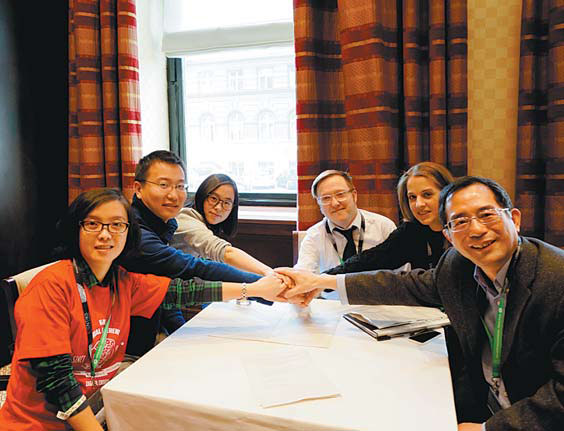Setting out on a global career path
Updated: 2015-07-24 08:09
By Chen Yingqun(China Daily Europe)
|
|||||||||||
|
The IAESTE China team is creating a new program for short exchange visits. |
China's education system has traditionally put too little emphasis on student creativity and professional training, Wu says, and the association wants to broaden students' horizons through contact with other cultures.
Zhang Cong, who works in the Shanghai office of the Swedish automotive company Scania Group, says the association's program has had a big impact on her career. She knew little about the company before taking part in one of the association's intern programs in 2013 when she was a university student. She realized the company's potential in China after working in the company's headquarters in Sweden and successfully applied for the job in Shanghai, supported by good reports about her internship from head office.
Wu compares the association to a highway that connects the world, now used chiefly by interns but which in future could be open to a wider range of individuals who want to improve their skills and broaden their minds. In the process, he says, the association would ensure quality control, including assessing academic and professional credentials, so the flow benefits individuals, companies and institutions.
The association's first 10 years in China were difficult, Wu says, and every year only 20 to 30 Chinese students were sent overseas, matching the number of overseas students brought to China. The main difficulty is finding Chinese companies in which overseas interns can perform well, he says.
"Any Chinese company that is going to take overseas interns needs to have an international environment, be English-speaking, understand Western culture and know how to manage projects in an international way and help maximize the use of interns' talent in three months. Few Chinese companies can do that. "
In the first few years, too, many Western interns complained that their internships failed to meet their expectations, Wu says.
"Chinese companies didn't know how to help them perform in such a short time. They made a great deal of effort but achieved little. Yes, the interns got the chance to taste nice food and experience a different culture, but they got few opportunities to contribute to projects, something that appeals to overseas interns."
But things have changed and Chinese companies are now becoming more competitive internationally. The languages and educational backgrounds of employees have also become more global.
Wu says the association in China is now creating a program called LePA (Learning through Participation and Achievement), designed with his team Angels Pique and Huang Bei and with certain Chinese companies so that even very short exchanges can benefit skilled people and employers.
"At the moment we are identifying the needs of students and companies. Even programs of just three months have proven valuable to both sides."
By creating an international working environment at home, Chinese employers and managers in the companies are more confident about working with people from diverse backgrounds as they continue to go global.
Wu says it used to be that most of those interested in China were leaders and entrepreneurs, but now young people are taking China into account when planning their careers.
"The world is super interested in China, whether they are senior people or not," Wu says. "To many people China is like a riddle. It is huge, with a long history and a large population, and the culture is very homogeneous. So people wonder what it is like.
"Moreover, career competition is now global, so young people need to prepare themselves for that, and the ambitious will definitely want to come to China."
Most of the student exchanges with China are with European countries, Wu says, and in Europe it is in China that most potential exchange students show interest.
IAESTE China now arranges about 200 student exchanges a year, a miniscule figure when you consider China's population, Wu says.
It is now working with the likes of Zhejiang University and Shanghai University on a special program in which these institutions set up scholarships for the exchange students and help the association choose from the best among them.
However, Wu says he would like more support from the Ministry of Education as the association seeks to work with the country's top universities in helping more Chinese students benefit from the program.
"It is the right time to upgrade the program to the next level," he says.
chenyingqun@chinadaily.com.cn
Today's Top News
Discovery of Earth-like planet disappoints Chinese Web users
Turkish warplanes destroy IS targets
Financial Times sale – the deal no-one saw coming
Deficit hits $104b in first half
Warriors star in lakeside opera spectacular
Greek parliament passes crucial bailout bill
Astronomers discover most Earth-like planet yet
Ministry: No date set for nationwide two-child policy
Hot Topics
Lunar probe , China growth forecasts, Emission rules get tougher, China seen through 'colored lens', International board,
Editor's Picks

|

|

|

|

|

|







